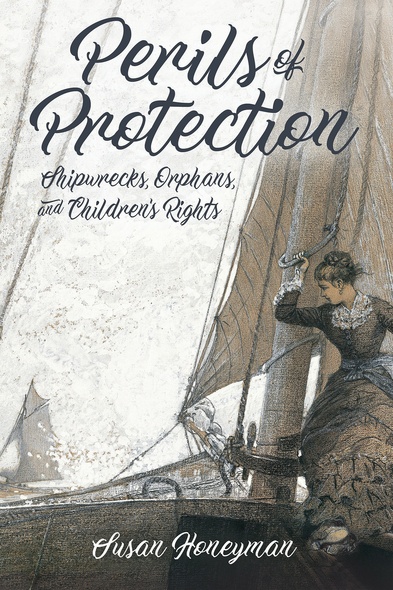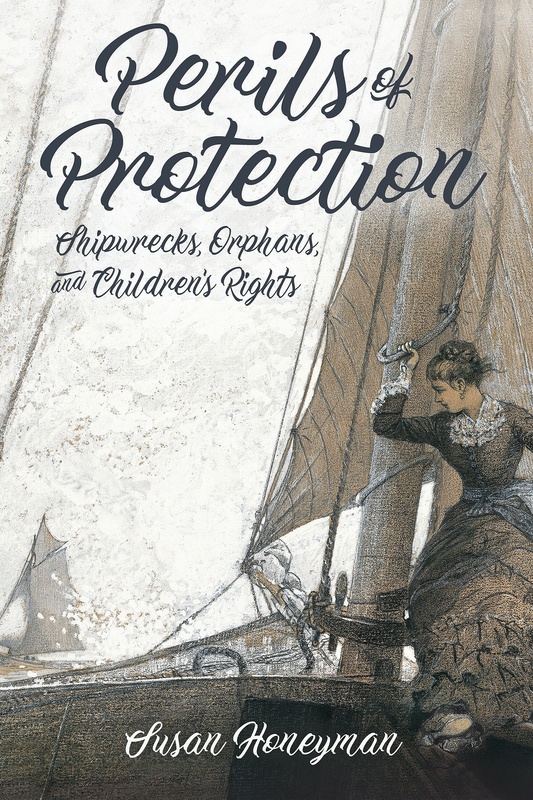
Perils of Protection
Shipwrecks, Orphans, and Children's Rights
Winner of the Children’s Literature Association’s 2020 Honor Book Award
Unrecognized in the United States and resisted in many wealthy, industrialized nations, children’s rights to participation and self-determination are easily disregarded in the name of protection. In literature, the needs of children are often obscured by protectionist narratives, which redirect attention to parents by mythologizing the supposed innocence, victimization, and vulnerability of children rather than potential agency.
In Perils of Protection: Shipwrecks, Orphans, and Children’s Rights, author Susan Honeyman traces how the best of intentions to protect children can nonetheless hurt them when leaving them unprepared to act on their own behalf. Honeyman utilizes literary parallels and discursive analysis to highlight the unchecked protectionism that has left minors increasingly isolated in dwindling social units and vulnerable to multiple injustices made possible by eroded or unrecognized participatory rights.
Each chapter centers on a perilous pattern in a different context: “women and children first” rescue hierarchies, geographic restriction, abandonment, censorship, and illness. Analysis from adventures real and fictionalized will offer the reader high jinx and heroism at sea, the rush of risk, finding new families, resisting censorship through discovering shared political identity, and breaking the pretenses of sentimentality.
This timely monograph asks us to look beyond the prioritizing of childhood in contemporary culture and to see the negative consequences of ‘privatizing families, islanding childhood, [and] worshiping children individually but obscuring them as a political interest group’ (177). Honeyman skewers many contemporary beliefs about, and aspirations for, children. Her direct language is neatly balanced by scholarly rigor and thorough archival research.
As a reader, I felt dazzled by Honeyman’s powerhouse scholarship and expansive, ideologically potent argument. She grounds her ideas in the history and the present realities of childhood, and she asks whether children’s literature upholds children’s rights and agency (sometimes it does, sometimes it doesn’t). Her texts are well chosen and her histories of maritime tragedies and violence are at times not for the faint of heart.
Susan Honeyman’s Perils of Protection is an engaging, incisive, and illuminating book. Deeply informed by histories of childhood, histories of the family, and children’s rights studies, Honeyman meticulously examines a wide range of texts to demonstrate how the endurance of the myth of childhood innocence has often resulted in cultural practices that disempower and isolate children. Perils of Protection is also an ardent defense of children’s rights to participation, pointing us to narratives of children, both fictional and real, who question and resist cultures of confinement. It is a vital volume, especially timely in this moment when we are bearing witness to vibrant activist movements initiated and animated by young people.
Drawing on an impressive array of scholarship from legal, cultural, and literary studies, Honeyman’s book offers a superb analysis of the persistent rhetoric of protection structuring the stories we tell about childhood and its possibilities. Honeyman demonstrates—in lively, crackling prose—the costs of adult protectionism and the pressing need for community engagement with children’s rights. This fascinating analysis ranges across history and across genre, as each page resists sentimentalism and faces head-on the implications of adult containment of childhood. Perils of Protection is an extraordinary accomplishment.
Susan Honeyman is professor of English at the University of Nebraska. She is author of Elusive Childhood: Impossible Representations in Modern Fiction; Consuming Agency in Fairy Tales, Childlore, and Folkliterature; and Child Pain, Migraine, and Invisible Disability.




